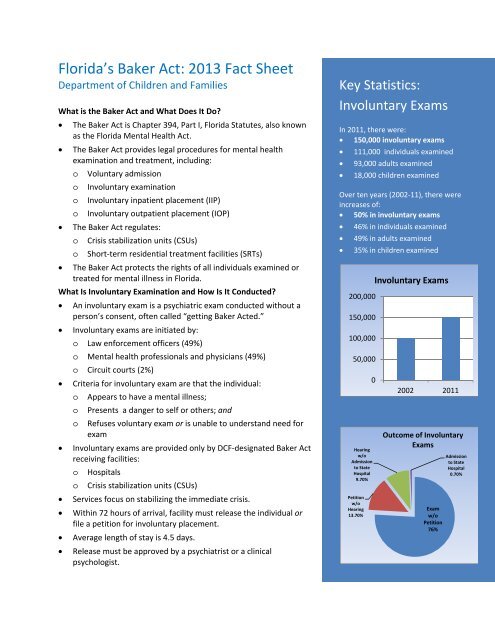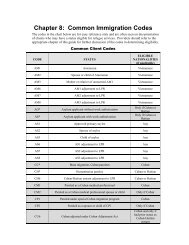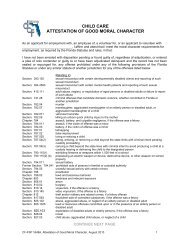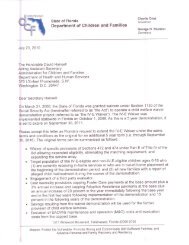Florida's Baker Act: 2013 Fact Sheet - Florida Department of ...
Florida's Baker Act: 2013 Fact Sheet - Florida Department of ...
Florida's Baker Act: 2013 Fact Sheet - Florida Department of ...
Create successful ePaper yourself
Turn your PDF publications into a flip-book with our unique Google optimized e-Paper software.
<strong>Florida</strong>’s <strong>Baker</strong> <strong>Act</strong>: <strong>2013</strong> <strong>Fact</strong> <strong>Sheet</strong><strong>Department</strong> <strong>of</strong> Children and FamiliesWhat is the <strong>Baker</strong> <strong>Act</strong> and What Does It Do? The <strong>Baker</strong> <strong>Act</strong> is Chapter 394, Part I, <strong>Florida</strong> Statutes, also knownas the <strong>Florida</strong> Mental Health <strong>Act</strong>. The <strong>Baker</strong> <strong>Act</strong> provides legal procedures for mental healthexamination and treatment, including:o Voluntary admissiono Involuntary examinationo Involuntary inpatient placement (IIP)o Involuntary outpatient placement (IOP) The <strong>Baker</strong> <strong>Act</strong> regulates:o Crisis stabilization units (CSUs)o Short‐term residential treatment facilities (SRTs) The <strong>Baker</strong> <strong>Act</strong> protects the rights <strong>of</strong> all individuals examined ortreated for mental illness in <strong>Florida</strong>.What Is Involuntary Examination and How Is It Conducted? An involuntary exam is a psychiatric exam conducted without aperson’s consent, <strong>of</strong>ten called “getting <strong>Baker</strong> <strong>Act</strong>ed.” Involuntary exams are initiated by:o Law enforcement <strong>of</strong>ficers (49%)o Mental health pr<strong>of</strong>essionals and physicians (49%)o Circuit courts (2%) Criteria for involuntary exam are that the individual:o Appears to have a mental illness;o Presents a danger to self or others; ando Refuses voluntary exam or is unable to understand need forexam Involuntary exams are provided only by DCF‐designated <strong>Baker</strong> <strong>Act</strong>receiving facilities:o Hospitalso Crisis stabilization units (CSUs) Services focus on stabilizing the immediate crisis. Within 72 hours <strong>of</strong> arrival, facility must release the individual orfile a petition for involuntary placement. Average length <strong>of</strong> stay is 4.5 days. Release must be approved by a psychiatrist or a clinicalpsychologist.Key Statistics:Involuntary ExamsIn 2011, there were: 150,000 involuntary exams 111,000 individuals examined 93,000 adults examined 18,000 children examinedOver ten years (2002‐11), there wereincreases <strong>of</strong>: 50% in involuntary exams 46% in individuals examined 49% in adults examined 35% in children examined200,000150,000100,00050,0000Hearingw/oAdmissionto StateHospital9.70%Petitionw/oHearing13.70%Involuntary Exams2002 2011Outcome <strong>of</strong> InvoluntaryExamsExamw/oPetition76%Admissionto StateHospital0.70%
Key Statistics: Funding& Bed Capacity<strong>Department</strong> Budget for <strong>Baker</strong> <strong>Act</strong> BedsFY 12‐13:Adult BedsChild BedsTotal$63.4 million$14.0 million$77.4 million<strong>Baker</strong> <strong>Act</strong> Receiving Facilities:CSUs (All Public) 54Public Hospitals 13Private Hospitals 59Total 126<strong>Baker</strong> <strong>Act</strong> Bed Capacity:Adult ‐ CSU 903Adult ‐ Public Hospital 659Adult – Private Hospital 2,632*Total Adult Beds 4,194Child – CSU 196Child – Public Hospital 209Child – Private Hospital 329*Total Child Beds 734*Private hospital beds are not intended toserve indigent individuals, although they aresometimes used for that purpose.Funding Sources For <strong>Baker</strong><strong>Act</strong> BedsNon‐DCF4,30787%DCF62113%What Is Involuntary Inpatient Placement (IIP)? Involuntary inpatient placement (IIP) is the <strong>Baker</strong> <strong>Act</strong>’s term forcivil commitment. IIP allows an individual to be admitted for mental healthtreatment (beyond stabilization <strong>of</strong> the immediate crisis) withouttheir consent. IIP requires:o Meeting criteria very similar to those for involuntaryexamination.o A petition filed by the receiving facility within the 72 hourinvoluntary exam period.o Supporting opinions <strong>of</strong> a psychiatrist and either a secondpsychiatrist or a clinical psychologist.o A court order based on a hearing where at least one <strong>of</strong> thepr<strong>of</strong>essionals testifies. An individual ordered to IIP may receive services in:o A state mental health treatment facility (SMHTF) (“statehospital”) (avg. length <strong>of</strong> stay = 1.7 years)o A short‐term residential treatment facility (SRT).o IIP may be ordered for up to 6 months, and may beextended with additional hearings.What Is Involuntary Outpatient Placement (IOP)? Involuntary outpatient placement (IOP) is a form <strong>of</strong> commitmentthat allows individuals to be mandated by the court to receivemental health treatment on an outpatient basis.Criteria for IOP are more difficult to meet than criteria forinvoluntary inpatient placement. For IOP, the individual must:ooHave a history <strong>of</strong> noncompliance with treatment and beunlikely to survive safely in the community withoutsupervision.Have, within the last 36 months:• Received at least two <strong>Baker</strong> <strong>Act</strong> involuntary exams;OR• Received mental health services in a forensic orcorrectional facility; OR• Engaged in serious violent behavior or attempts atself‐harmIOP has been used infrequently and provider participation varies.It is currently available in Escambia, Santa Rosa, Leon, Volusia,Manatee, Sarasota, Seminole, and DeSoto Counties.
















